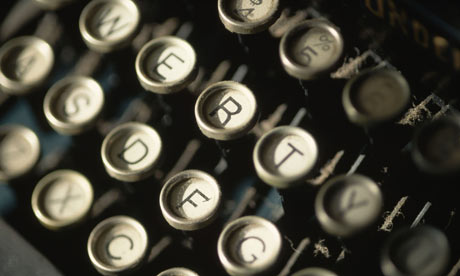
Not all cliches are universal. If writers want to avoid both the effort of originality and the risk of giving someone "house" in reviewer bingo, there is a simple way: stick to the phrases that only you overuse. Your own personal cliches, to employ a snowclone.
You may still get caught, of course, if you're prominent enough. By now, Michiko Kakutani of the New York Times must wince every time she hears the word "limn". And some formats seem to make personal tics particularly glaring: in the past few weeks alone, the world of podcasting has given us Sid Lowe bingo and a Slate Political Gabfest drinking game, played out live in front of the panellists.
But what if you want to kick bad habits and you don't have the aid of a live audience with cue cards? Well, you could get a commission from the New Yorker. Here's how Julian Barnes, in the preface to his essay collection Letters from London, describes the process of having his prose examined by Charles McGrath, then one of the magazine's editors:
"About halfway through my stint we were on our third or fourth extended conversation about a particular piece; it had been through a couple of sets of galleys and was now in page proof. By this stage any writer knows the article by heart: you are as fed up with it as you are familiar, you long for it to be put to bed, but you civilly attend to what you hope will be the last few queries. It was at this point that Chip picked on an adjective I'd used, one of those words like, say, crepuscular or inspissated, which don't form part of your core vocabulary but which you reach for from time to time. 'You've used crepuscular before,' said Chip. 'I don't think so,' I replied. 'Yes, I think you have,' he said. 'I'm fairly sure I haven't,' I replied, beginning to feel a little irritated - hell, I knew this piece inside out. 'I'm pretty sure you have,' Chip responded - and I could hear his tone hardening too, as if he was really going to dig in on this one. 'Well,' I said rather snappily, 'which galley did I use it on then?' 'Oh,' said Chip, 'I don't mean this piece. No, it was a couple of pieces back. I'll look it up.' He did. I'd used the word some nine months previously. I naturally excised it now. And that, if anyone wants to know, is editing."
Very good. But what if you don't have a live audience or Charles McGrath? Then you must examine your soul, and perhaps the text files on your hard drive. And then you must confess in the comments, so that we may all keep each other to higher standards and/or store material for blackmail.
After that buildup, I'm obliged to confess first. So: just on a quick Google, the things that I have found "startling" recently include the suggestion of attacking a mugger with a bicycle pump, a routine decision by the Competition Commission, a new presenter on Test Match Special, the paucity of references to national papers in an old novel about journalism and the visual effects in an Edwardian film. Either I'm choosing my adjectives lazily, or I startle very easily. Burst a paper bag and watch me jump.

